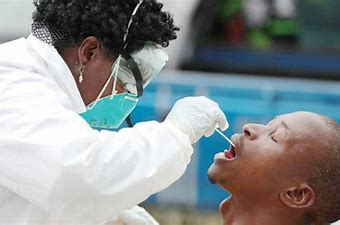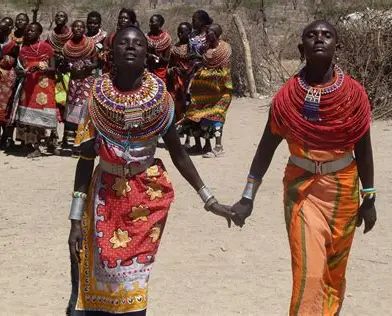
In the early months of the Covid-19 pandemic, Africa’s rapid and coordinated response, informed by emerging data, was remarkable. Now, in 2022, as vast vaccination campaigns have enabled the global north to gain some control over the pandemic, Africa lags behind.
Since the 1960s, when many African countries gained independence, the continent has largely depended on the outside world for its health-security commodities: diagnostics, therapeutics and vaccines, as well as personal protective equipment and other medical supplies.
The Covid-19 pandemic has exposed how easily international cooperation and multilateral agreements can dissolve, especially in the face of a global crisis – and just how vulnerable this dependence leaves Africa. In 2017 and 2018, more than 120 disease outbreaks were reported on the continent.
In our view, leaders of the 55 African Union member states face a stark choice.
In principle, Africa could build on the astonishing gains it has made in surveillance and public-health responsiveness to outbreaks in recent years. It could sufficiently invest in commodities to ensure its health security and position itself as a world leader in fighting infectious diseases.
The alternative? There really isn’t one. If the continent does not work towards guaranteeing self-sufficiency, it will fail to address the infectious-disease threats of the twenty-first century. It will thereby be unable to achieve the development goals encapsulated in the African Union’s Agenda 2063: The Africa We Want. This is a blueprint for transforming the continent into a global powerhouse, laid out in 2013.
In 2017, following the 2014-16 Ebola outbreak in West Africa, the African Union launched the Africa Centres for Disease Control and Prevention (Africa CDC) to help prepare the continent for epidemics and pandemics. Millions of dollars of investment by members of the African Union and organisations such as the Africa Development Bank, the World Bank, partner nations and foundations have bolstered the capability of the Africa CDC and its Regional Collaborating Centres to handle disease outbreaks.
The regional centres are networks of public-health institutions hosted in Egypt, Kenya, Zambia, Gabon and Nigeria for the northern, eastern, southern, central and western regions, respectively.
Just days after the first case of Covid-19 was reported in Egypt in mid-February 2020, the African Union and the Africa CDC convened an emergency meeting of all ministers of health in Addis Ababa, Ethiopia. Attendees agreed to a Joint Continental Strategy, whereby African Union member states would cooperate, collaborate, coordinate and communicate their efforts. The Africa CDC had already established the Africa Task Force for Coronavirus (AFTCOR) in early February 2020 to help achieve this.
In early March 2020, as cases of Covid-19 spread across the continent, countries took immediate and drastic measures, including implementing lockdowns and other restrictions designed to reduce transmission. This continent-wide collaboration was sustained. Since March 2020, AFTCOR has conducted bi-weekly meetings.
The Bureau of the Assembly of the African Union Heads of State and Government (a body that coordinates the affairs of the African Union between the union’s yearly summits) has also convened nearly every month to review Africa’s response to the pandemic, with the Africa CDC providing technical guidance.
So far, 12 initiatives have been launched because of this coordination. These include the Partnership to Accelerate COVID-19 Testing in Africa, which has helped to secure diagnostics; the Africa Medical Supplies Platform, which has enabled the purchasing of crucial medical supplies; and the African Vaccine Acquisition Task Team (AVATT), a centralized purchasing agent established in November 2020 to make it easier for African Union member states to secure vaccines. So far, AVATT has enabled the continent to obtain 400 million doses of vaccines.
Meanwhile, Africa’s centres for genomics have achieved impressive feats in surveillance. Coordination has come from the Africa CDC and national public-health institutions, such as the Nigeria Centre for Disease Control in Abuja. In March 2020, the first African SARS-CoV-2 genome was sequenced in Nigeria, only 48 hours after a sample (from a patient who had travelled from Italy) arrived at the African Centre of Excellence for Genomics of Infectious Diseases (ACEGID) in Ede, with results released after 72 hours.
In October that year, the Beta variant was discovered within days of a sample reaching the Network for Genomic Surveillance South Africa consortium, a collaboration of laboratories, researchers and academic institutions across the country.
In November 2021, the heavily mutated Omicron variant was spotted in genome-sequencing data from Botswana and identified by researchers in South Africa.
Indeed, the best-resourced genomic centres have supported many other countries besides their own. So far, ACEGID (which CTH directs), for instance, has sequenced samples from around 30 African countries. Researchers working at the centre have also trained more than 1,300 geneticists and public-health workers and officials from other countries in diagnostics and genomics for infectious diseases. After three weeks, trainees return to their own countries and apply what they have learnt, even though their equipment might be more basic than ACEGID’s.
All of these sequencing efforts continue to guide local, regional, national and international public-health responses. Between April and July 2020, for instance, sequencing information obtained in Nigeria revealed that people were obeying lockdown restrictions during the day, but did so less at night. Most recently, alerting the world to the Omicron variant has spurred intensified surveillance in Africa and an explosion of new immunology and sequencing research, as well as changes to public policy in the global north.
Such feats in coordination and collaboration — which have enabled many African nations to make the best use of available resources — stand in contrast to the inflexibility seen in other parts of the world.
- A Nature report






